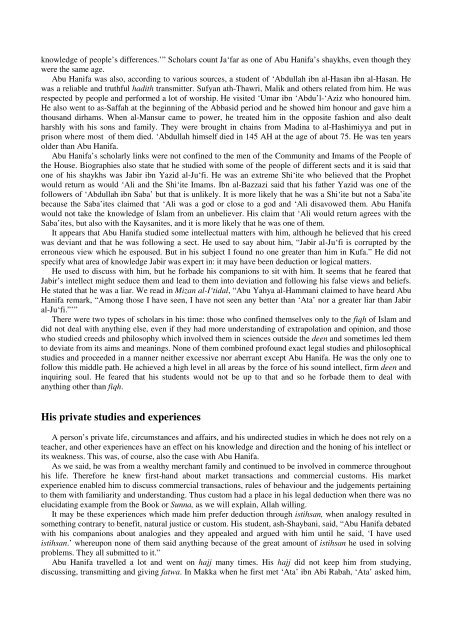Create successful ePaper yourself
Turn your PDF publications into a flip-book with our unique Google optimized e-Paper software.
knowledge of people’s differences.’” Scholars count Ja‘far as one of <strong>Abu</strong> <strong>Hanifa</strong>’s shaykhs, even though they<br />
were the same age.<br />
<strong>Abu</strong> <strong>Hanifa</strong> was also, according to various sources, a student of ‘Abdullah ibn al-Hasan ibn al-Hasan. He<br />
was a reliable <strong>and</strong> truthful hadith transmitter. Sufyan ath-Thawri, Malik <strong>and</strong> others related from him. He was<br />
respected by people <strong>and</strong> performed a lot of worship. He visited ‘Umar ibn ‘Abdu’l-‘Aziz who honoured him.<br />
He also went to as-Saffah at the beginning of the Abbasid period <strong>and</strong> he showed him honour <strong>and</strong> gave him a<br />
thous<strong>and</strong> dirhams. When al-Mansur came to power, he treated him in the opposite fashion <strong>and</strong> also dealt<br />
harshly with his sons <strong>and</strong> family. They were brought in chains from Madina to al-Hashimiyya <strong>and</strong> put in<br />
prison where most of them died. ‘Abdullah himself died in 145 AH at the age of about 75. He was ten years<br />
older than <strong>Abu</strong> <strong>Hanifa</strong>.<br />
<strong>Abu</strong> <strong>Hanifa</strong>’s scholarly links were not confined to the men of the Community <strong>and</strong> <strong>Imam</strong>s of the People of<br />
the House. Biographies also state that he studied with some of the people of different sects <strong>and</strong> it is said that<br />
one of his shaykhs was Jabir ibn Yazid al-Ju‘fi. He was an extreme Shi‘ite who believed that the Prophet<br />
would return as would ‘Ali <strong>and</strong> the Shi‘ite <strong>Imam</strong>s. Ibn al-Bazzazi said that his father Yazid was one of the<br />
followers of ‘Abdullah ibn Saba’ but that is unlikely. It is more likely that he was a Shi‘ite but not a Saba’ite<br />
because the Saba’ites claimed that ‘Ali was a god or close to a god <strong>and</strong> ‘Ali disavowed them. <strong>Abu</strong> <strong>Hanifa</strong><br />
would not take the knowledge of Islam from an unbeliever. <strong>His</strong> claim that ‘Ali would return agrees with the<br />
Saba’ites, but also with the Kaysanites, <strong>and</strong> it is more likely that he was one of them.<br />
It appears that <strong>Abu</strong> <strong>Hanifa</strong> studied some intellectual matters with him, although he believed that his creed<br />
was deviant <strong>and</strong> that he was following a sect. He used to say about him, “Jabir al-Ju‘fi is corrupted by the<br />
erroneous view which he espoused. But in his subject I found no one greater than him in Kufa.” He did not<br />
specify what area of knowledge Jabir was expert in: it may have been deduction or logical matters.<br />
He used to discuss with him, but he forbade his companions to sit with him. It seems that he feared that<br />
Jabir’s intellect might seduce them <strong>and</strong> lead to them into deviation <strong>and</strong> following his false views <strong>and</strong> beliefs.<br />
He stated that he was a liar. We read in Mizan al-I‘tidal, “<strong>Abu</strong> Yahya al-Hammani claimed to have heard <strong>Abu</strong><br />
<strong>Hanifa</strong> remark, “Among those I have seen, I have not seen any better than ‘Ata’ nor a greater liar than Jabir<br />
al-Ju‘fi.”’”<br />
There were two types of scholars in his time: those who confined themselves only to the fiqh of Islam <strong>and</strong><br />
did not deal with anything else, even if they had more underst<strong>and</strong>ing of extrapolation <strong>and</strong> opinion, <strong>and</strong> those<br />
who studied creeds <strong>and</strong> philosophy which involved them in sciences outside the deen <strong>and</strong> sometimes led them<br />
to deviate from its aims <strong>and</strong> meanings. None of them combined profound exact legal studies <strong>and</strong> philosophical<br />
studies <strong>and</strong> proceeded in a manner neither excessive nor aberrant except <strong>Abu</strong> <strong>Hanifa</strong>. He was the only one to<br />
follow this middle path. He achieved a high level in all areas by the force of his sound intellect, firm deen <strong>and</strong><br />
inquiring soul. He feared that his students would not be up to that <strong>and</strong> so he forbade them to deal with<br />
anything other than fiqh.<br />
<strong>His</strong> private studies <strong>and</strong> experiences<br />
A person’s private life, circumstances <strong>and</strong> affairs, <strong>and</strong> his undirected studies in which he does not rely on a<br />
teacher, <strong>and</strong> other experiences have an effect on his knowledge <strong>and</strong> direction <strong>and</strong> the honing of his intellect or<br />
its weakness. This was, of course, also the case with <strong>Abu</strong> <strong>Hanifa</strong>.<br />
As we said, he was from a wealthy merchant family <strong>and</strong> continued to be involved in commerce throughout<br />
his life. Therefore he knew first-h<strong>and</strong> about market transactions <strong>and</strong> commercial customs. <strong>His</strong> market<br />
experience enabled him to discuss commercial transactions, rules of behaviour <strong>and</strong> the judgements pertaining<br />
to them with familiarity <strong>and</strong> underst<strong>and</strong>ing. Thus custom had a place in his legal deduction when there was no<br />
elucidating example from the Book or Sunna, as we will explain, Allah willing.<br />
It may be these experiences which made him prefer deduction through istihsan, when analogy resulted in<br />
something contrary to benefit, natural justice or custom. <strong>His</strong> student, ash-Shaybani, said, “<strong>Abu</strong> <strong>Hanifa</strong> debated<br />
with his companions about analogies <strong>and</strong> they appealed <strong>and</strong> argued with him until he said, ‘I have used<br />
istihsan.’ whereupon none of them said anything because of the great amount of istihsan he used in solving<br />
problems. They all submitted to it.”<br />
<strong>Abu</strong> <strong>Hanifa</strong> travelled a lot <strong>and</strong> went on hajj many times. <strong>His</strong> hajj did not keep him from studying,<br />
discussing, transmitting <strong>and</strong> giving fatwa. In Makka when he first met ‘Ata’ ibn Abi Rabah, ‘Ata’ asked him,














